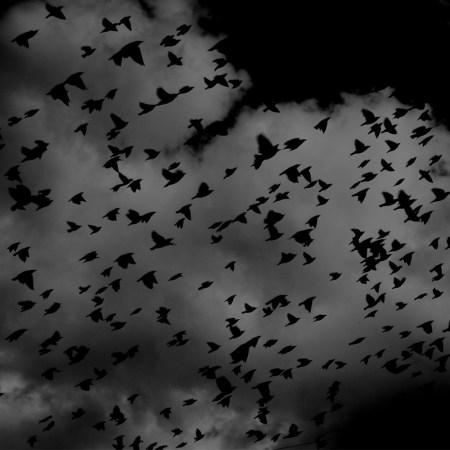The heavens are heavy, they hold eternity. The 25-ton lintel stones of Stonehenge have stood for one and a half million nights. Imagine that! These beautiful, millennia-scarred stele are graceful enough to remain upright and lovely, yet strong and mean enough to hold up the heavens. The heavy metal of our dreams should do the same.
Imagine a metal album so good it was as if you dreamed it.
The Sciences, the first new album of the century from the legendary doom/stoner metal trio called Sleep, is certainly the best rock album since The Bends; in fact, it’s possibly the most fascinating, focused, and intense (yet utterly listenable) metal album since Funhouse by the Stooges. Even more impressively, it pretty much matches the great, shaking, shattering Golem-on-a-rampage stride of Sleep’s Dopesmoker, an LP I consider the best album of the last 25 years.
For those unfamiliar, Dopesmoker is an album-length song/seismic event that Sleep originally recorded in 1996 (and released in slightly altered forms in 1999, 2003, and 2012). Dopesmoker is a startling specimen of originality, ambition, and assembly, the metal equivalent of Pet Sounds; it’s a 63-minute grinding, muffler dragging, riffing and ripping catheter-insertion shriek/cantata that tells the story of a stoner Jesus wandering in the desert. It shouldn’t work, but it utterly does, and it reset the boundaries of metal in the way that Pet Sounds, The Velvet Underground & Nico, Ramones, or Discharge’s Hear Nothing See Nothing Say Nothing reset their genres (note: the 1999 release was titled Jerusalem, and I personally consider it slightly inferior to the “real” Dopesmoker). Sleep’s sole release since Dopesmoker – a 2014 single called “The Clarity” – was on the high side of okay, but it gave no indication that the band would ever again equal the avalanche of artistry, originality, utile stupidity and brilliance that was Dopesmoker.
But they have.
The Sciences is a deeply satisfying album, steady and swaggering yet full of boots and opium, sort of a cross between Funhouse and Dark Side of the Moon (or imagine if Saint Vitus has decided to create an equivalent to the Moody Blues’ Days of Future Passed). This pyramid-stone poppy-flower rattle of an album just rolls and rolls over you. It is heavy beyond belief yet also earth-moist with a lulling, seductive charm; it’s like waiting for the end of the world underneath the most beautiful aurora borealis, and almost Faith-era Cure-like in its ability to drop you down a deep, dark hole and leave you there, happily.
Everything that was right about Dopesmoker (the epic mixture of the sacred and the profane, the ridiculous and the legitimately deep) is here, but in (slightly) more compact, more riff-driven form. Unlike Dopesmoker, nothing on The Sciences ever drifts too far from a riff – in fact, everything is pretty much nailed to a riff (again, we are reminded of Funhouse), which, on nearly every song, repeats repeats repeats repeats without ever once becoming boring; instead, the slurring, crunching riffs are like a mesmerizing turn signal on a car that you’ve accidentally driven into tarry space. Certainly, there are solos, but far fewer than on Dopesmoker, and each of the solos on The Sciences sounds like necessary and frantic releases that seem to say, Get these acupuncture needles out of me, they burn! Seriously, what you have on The Sciences is like half a dozen mini-Dopesmoker’s (“Sonic Titan,” one of the album’s triumphs, actually echoes some of the chordal changes and dynamics of Dopesmoker).
I also suspect that no band, ever, has so successfully mixed the hypnotic and the heavy. In fact, the only group that has even approached this kind of territory –Stooges/Sabbathian/Blue Cheer riffs over a planetarium zoneöut – were the West German band Ash Ra Tempel, whose self-titled first album (released in 1971) sounded like Hendrix and Ron Asheton jamming with Neu! (and I suspect it may have been an influence on Dopesmoker).
I’ll also note that it’s nice to hear this kind of slug-slam heaviness without the usual cookie monster or Ozzy-howl vocals (which were slightly present on Dopesmoker). On The Sciences, Bassist/vocalist Al Cisneros has a distinctive, effective and peculiar vocal approach that reminds me of something between Ian Anderson of Tull and BÖC’s Eric Bloom (which is to say it’s vaguely like a less lascivious Buzz Osbourne). It is an extra-articulate rhythmic sing/speak that, peculiarly, has an edge of Celtic folk.
Also, it is adamantly clear that Sleep, despite the martial, sludgy riffs, has without any doubt transcended the Sabbath slur that is the foundation of their entire genre. On The Sciences that element of style has just been adopted as a given, in much the same way that, say, the early barre chords of Dave Davies assumed Bo Diddley and Eddie Cochran as a given. Sabbath is no more a specter on this album than the Everlys were with the Beatles or Mick Ronson was with the Sex Pistols; it is a formational (and informational) influence, not the raison d’etre.
It’s also important to note that The Sciences fulfills the promise and potential of an entire generation of American rock bands who may have been too wrapped up in self-myth to achieve this kind of album-length transcendence.
For instance, Black Flag (who, even with all of Sleep’s obvious Sabbathisms, must be regarded as a primal influence here) never seemed to connect the monumental with the massive (or even, really, come close). It was enough for Black Flag to become the blueprint for every road-dog metal and punk and band of the 1980s and ‘90s, and to pioneer a kind of lo-fi Stooges-meets-MC5-meets-Tyranny and Mutation post-Sun Ra metal; they didn’t feel the need to actually try to bring it together for a classic, track-to-track holy American rock album. Likewise, Sonic Youth were too wrapped up in self-myth and irony to create the steady, patient, unfolding artwork that defines a great classic rock album; and the Melvins, well, the Melvins couldn’t decide if they were Earth or Red Kross long enough to really make that one album that didn’t just startle, but lasted. And this is all terribly sad; it reflects a certain generation’s belief that they were too good to be really good (dig into that sentence a bit; I have just summed up an entire era, pallie).
The groups who have come closest to making fully formed big rock statements in the last thirty (or so) years have generally emerged from the new metal field. Many of these acts, intrinsically, understand the idea of majesty, tonal and tempo diversity, and power. Here I direct you to two magnificent album-length achievements from earlier this century: Opeth’s Pale Communion and Celtic Frost’s Monotheist (and Opeth’s Heritage isn’t that far behind). These albums work because their creators are trying to build shrines to the ears and the ability of well-tuned headphones to blow the mind of the listener, and they are doing so without any sense of looking over their shoulder for the cruel, taunting ghost of irony or the chic siren of trends.
A couple of years back, I saw Sleep at an old gasp of a theatre in Los Angeles. That night, a few things happened that I had never experienced at a show before: First of all, one of my companions noted that the volume and repetition was so extreme that they could no longer focus their vision, and they were genuinely afraid that their eyeballs would shake loose from the optic nerve. Secondly, about two-thirds of the way through the set, I believed there was a genuine threat that the bass frequencies were going to bring the building down — we were up in the balcony, and it honestly felt like a prolonged, steady seismic event – so I insisted that we abandon the gig. Now, can you take all that, this sense of the extreme and the sensory, and translate it into a deep, completely engaging album-length achievement, a record that would be greater than the sum of its parts?
Well, Sleep did it. For the second time. And on The Sciences, they did it without the conceptual protection of a 63-minute song about a bong-wielding Nazarene.
With this kind of godliness in our midst, it is an insult that we continue to be told that rock is passé. How can rock be passé when one of the best metal albums of all time has just been released? Perhaps no band since Roth-era Van Halen has so much owned the idea of their genre; which is to say that if aliens landed today and asked, What is heavy metal?, we could just play them The Sciences by Sleep.
This article was featured in the InsideHook newsletter. Sign up now.
























